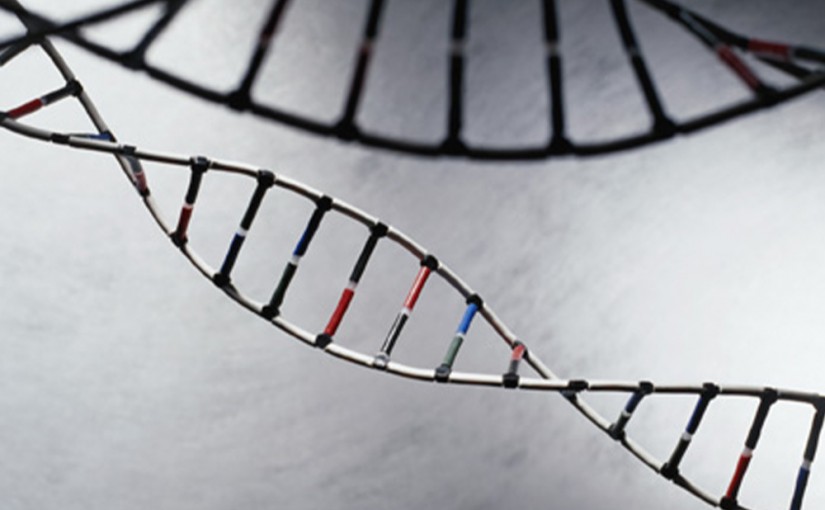DNA can be damaged by toxins, radiation, or even normal cell division, but human cells must continually fix DNA breaks to survive. In cells that cannot repair DNA effectively, changes (mutations) can occur that lead to cancer.
Most cells rely on a system called homologous recombination, or HR, which uses proteins called BRCA1 and BRCA2 for accurate DNA repair. Those born with a malfunctioning BRCA gene, however, often develop breast and ovarian cancers, with BRCA mutations and related HR problems recently found to occur in pancreatic and prostate cancer as well.
For this reason, identifying patients with “HR-deficient” cancers has become a priority in the field, in part because such cancer cells are vulnerable to targeted therapies that break their DNA. To find patients with HR deficiency, standard lab tests look for “scars” in the DNA of cancer cells, which happen when sloppy, backup repair processes are used instead of HR to create specific mutation patterns.
While accurate scar diagnosis enables more tailored treatment, researchers have been puzzled by the subtly of the scars found in HR-deficient cancers. Such scars create very small typos in the DNA code (sequence), which are invisible under the microscope. However, HR-deficient cells show dramatic structural rearrangements in much larger DNA structures called chromosomes that are visible by microscopy.
To tackle this paradox, Marcin Imieliński, MD, PhD, at NYU Langone Health’s Perlmutter Cancer Center, and Simon Powell, MD, PhD, at Memorial Sloan Kettering Cancer Center, applied “genome graph” techniques developed in Dr. Imieliński’s lab to detect massive structural DNA changes that rearrange, copy, and delete huge sections of chromosomes. Published online August 16 in the journal Nature, their study also analyzed DNA molecules a hundred times longer than those normally measured in cancer analyses.
Applying these methods, the research team identified “reciprocal pairs,” a new scar type seen in HR deficiency. By analyzing thousands of cancer genomes, the research team showed that when HR fails, reciprocal pair scars create specific chromosomal changes visible by microscope and that better explain the biology of HR-deficient cells.
The long molecules tell us that these scars come from two backup repair mechanisms—homology-independent replication restart and single-strand annealing—that may keep HR-deficient cancer cells alive. Blocking the mechanisms may represent new ways to treat these cancers.”
Dr. Marcin Imieliński, director of cancer genomics at Perlmutter Cancer Center and an attending pathologist at NYU Langone
The study authors note that their new techniques require the use of a technology called whole-genome sequencing (WGS), but that WGS costs are falling. The researchers say it may soon be practical to use their approach to find more HR-deficient patients and match them with targeted therapies.
In addition to NYU Langone’s Perlmutter Cancer Center and Memorial Sloan Kettering Cancer Center (MSKCC), the study was performed at the New York Genome Center (NYGC) and Weill Cornell Medicine (WCM) with co-first authors Jeremy Setton (MSKCC), Kevin Hadi (WCM and NYGC), and Zi-Ning Choo (WCM and NYGC). Also study authors from the NYGC and WCM were Katherine Kuchin, Huasong Tian, Joel Rosiene, Julie Behr, Xiaotong Yao, and Aditya Deshpande. Additional WCM study authors were Juan-Miguel Mosquera, Michael Sigouros, Jyothi Manohar, Jones Nauseef, and Olivier Elemento. Additional MSKCC study authors were Arnaud Da Cruz Paula, Pier Selenica, Britta Weigelt, Nadeem Riaz, and Jorge Reis-Filho.
This work was supported by the Starr Cancer Consortium Award I11-005, National Cancer Institute (NCI) grant 1P50CA247749, and the Burroughs Wellcome Fund Career Award for Medical Scientists. Unrelated to the current study, Dr. Imieliński is a member of scientific advisory board of ImmPACT Bio.
Setton, J., et al. (2023). Long-molecule scars of backup DNA repair in BRCA1- and BRCA2-deficient cancers. Nature. doi.org/10.1038/s41586-023-06461-2.
This article was published by: News-Medical.net


